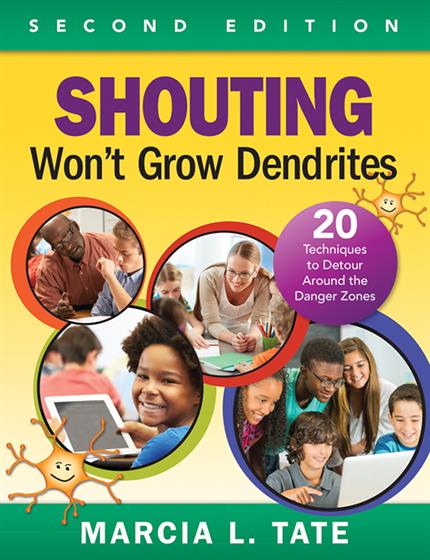Acknowledgments
About the Author
Introduction
Detour: Get to Know Each Student
1. Develop a Relationship With Each Student
What: Creating a Caring Culture
Why: Theoretical Framework
How: Classroom Application
Reflection
2. Expect the Best!
What: You Get What You Expect
Why: Theoretical Framework
How: Classroom Application
Reflection
3. Understand the Symptoms
What: Causes of Misbehavior
Why: Theoretical Framework
How: Classroom Application
Reflection
Detour: Create a Physical Environment Conducive to Learning
4. Light Up Their World
What: Lighting and the Brain
Why: Theoretical Framework
How: Classroom Application
Reflection
5. Let the Music Play
What: Music and the Brain
Why: Theoretical Framework
How: Classroom Application
Reflection
6. Color Their World
What: Color and the Brain
Why: Theoretical Framework
How: Classroom Application
Reflection
7. Stop and Smell the Roses
What: Aromas and the Brain
Why: Theoretical Framework
How: Classroom Application
Reflection
8. Create a Natural Environment
What: Room Arrangement and the Brain
Why: Theoretical Framework
How: Classroom Application
Reflection
Detour: Engage the Brains of Your Students
9. Use Brain-Compatible Strategies
What: Engaging the Brain
Why: Theoretical Framework
How: Classroom Application
Reflection
10. Hook Them Into Relevant Lessons
What: Attention and the Bain
Why: Theoretical Framework
How: Classroom Application
Reflection
11. Let Them Talk!
What: Conversation and the Brain
Why: Theoretical Framework
How: Classroom Application
Reflection
12. Let Them Move!
What: Movement and the Brain
Why: Theoretical Framework
How: Classroom Application
Reflection
13. Keep Them Laughing
What: Humor and the Brain
Why: Theoretical Framework
How: Classroom Application
Reflection
Detour: Develop a Proactive Management Plan
14. Teach Your Rituals
What: Establishing Your Procedures
Why: Theoretical Framework
How: Classroom Application
Reflection
15. Accentuate the Positive
What: Creating an Affirming Classroom Environment
Why: Theoretical Framework
How: Classroom Application
Reflection
16. Celebrate Good Times, Come On!
What: Celebrations and the Brain
Why: Theoretical Framework
How: Classroom Application
Reflection
17. Use Low-Profile Interventions
What: Intervening Appropriately
Why: Theoretical Framework
How: Classroom Application
Reflection
18. De-emphasize the Negative
What: Consequences For Misbehavior
Why: Theoretical Framework
How: Classroom Application
Reflection
19. Get Help With Chronic Behavior Challenges
What: Managing the Difficult to Manage
Why: Theoretical Framework
How: Classroom Application
Reflection
20. Solicit Parental Support
What: Parents on Your Side
Why: Theoretical Framework
How: Classroom Application
Reflection
Bibliography
Index



